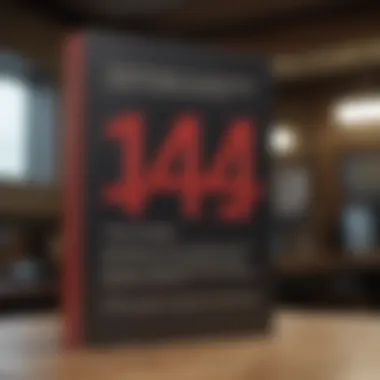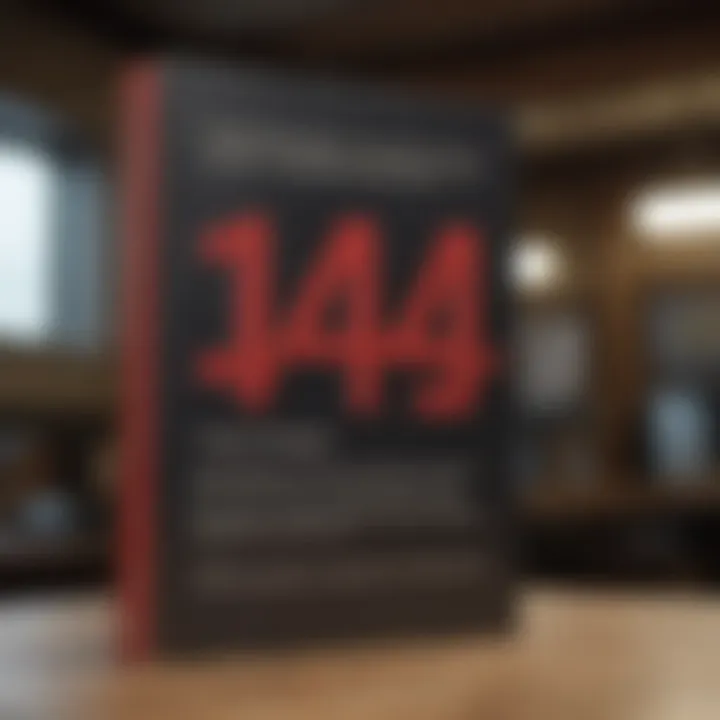Unveiling the Profound Depths of George Orwell's Masterpiece '1984'


Book Title and Author Introduction
Let's embark on a journey through the pages of George Orwell's striking novel, '1984', a masterstroke within dystopian literature. Orwell, a prominent British writer known for his astute social commentary, crafted this tale in 1949. The text plunges readers into a totalitarian future regime where individuality is suppressed and truth is malleable like putty. '1984' encapsulates themes of surveillance, propaganda, and the erosion of personal freedoms under oppressive governmental control.
Summary of Book Content
A succinct overview of '1984' reveals a chilling portrait of a world governed by Big Brother, a dictatorial figure wielding absolute power. Protagonist Winston Smith navigates a reality where reality is altered at will, and freedom of thought is a crime. Noteworthy quotes such as 'War is peace. Freedom is slavery. Ignorance is strength.' embody the sinister ethos pervading the narrative, inviting contemplation on the nature of truth and power.
Three Lessons Learned
Lesson 1: The Perils of Totalitarianism
With meticulous detail, Orwell illustrates the dangers of unchecked governmental control, urging readers to remain vigilant against encroachments on personal freedoms. Through Winston's tribulations, we glean the disastrous outcomes of stifling dissent and truth.
Lesson 2: Reality Manipulation
The novel starkly portrays the manipulation of truth and memory, prompting introspection on the significance of objective reality. Orwell's portrayal serves as a cautionary tale against the distortion of facts for political ends, resonating with contemporary concerns on misinformation.
Lesson 3: Resistance and Hope
In the face of oppressive systems, '1984' champions resilience and defiance. Winston's silent rebellion underscores humanity's enduring spirit and the quest for authentic connection amidst pervasive surveillance.
Practical Applications
Unpacking the lessons of '1984', one can apply its insights to varied real-life scenarios, from monitoring incursions on personal privacy to advocating for transparency in governance. Implementing these tenets in daily interactions fosters critical thinking and discernment, enabling individuals to navigate complexities with fortified awareness.
Introduction to ''


In this section of the article, we embark on a journey to unravel the layers of George Orwell's timeless masterpiece, '1984'. Delving deep into the intricacies of the novel, we aim to provide readers with a profound understanding of the themes, characters, and socio-political commentary that Orwell masterfully weaves throughout his narrative.
Background of George Orwell
George Orwell, a prolific British writer born as Eric Arthur Blair, lived through a tumultuous period of history marked by World War I, the Russian Revolution, and the rise of totalitarian regimes. These experiences profoundly shaped Orwell's worldview and served as the foundation for his critical examination of power, control, and surveillance in '1984'. Orwell's background as a colonial officer in Burma and his time spent living in poverty among the working class informed the social realism and political insight evident in his writing.
Historical Context of the Novel
The historical backdrop against which '1984' unfolds is crucial to understanding the depth of Orwell's message. Set in a dystopian world where authoritarianism reigns supreme, the novel reflects Orwell's apprehensions about the growing influence of totalitarian states during the mid-20th century. Inspired by the oppressive regimes of Stalinist Russia and Nazi Germany, Orwell's narrative serves as a cautionary tale against the dangers of unchecked government power and propaganda.
Significance of '' in Literature
'1984' stands as a monumental work in the literary canon, revered for its incisive critique of totalitarianism, censorship, and the erosion of individual freedoms. Orwell's novel not only serves as a stark warning against the perils of oppressive surveillance and government control but also resonates with readers across generations due to its universal themes of resistance, resilience, and the pursuit of truth. The novel's enduring relevance in today's society underscores the importance of eternal vigilance against threats to liberty and democracy.
Themes Explored
In this comprehensive analysis of George Orwell's iconic novel '1984', the exploration of themes plays a pivotal role in unraveling the layers of dystopia and societal control depicted in the narrative. By delving deep into the thematic nuances, readers can grasp the intricate web Orwell weaves, highlighting pertinent issues that resonate through time and space. Themes Explored in '1984', such as totalitarianism, surveillance, language manipulation, and the eternal struggle between the individual and society, reflect Orwell's astute observations on the human condition and the dangers of unchecked power dynamics.
Totalitarianism and Government Control
The theme of totalitarianism and government control in '1984' serves as a stark warning against the dangers of authoritarian rule and the erosion of individual freedoms. Orwell masterfully portrays a society where a repressive regime, embodied by the ominous figure of Big Brother, exercises complete domination over every aspect of its citizens' lives. The narrative paints a chilling picture of surveillance, censorship, and propaganda used as tools to maintain power, creating a climate of fear and conformity among the populace. Through Winston's rebellion and ultimate submission, Orwell forces readers to confront the horrors of unchecked governmental control and the fragility of personal autonomy.
Surveillance and Privacy
One of the central themes in '1984' revolves around the pervasive surveillance tactics employed by the Party to monitor and manipulate its citizens. The concept of 'Big Brother is watching you' epitomizes the constant state of scrutiny under which individuals live, breeding mistrust and paranoia. Orwell's exploration of the erosion of privacy underscores the dangers of unchecked state surveillance and the impact it has on individual agency and freedom. Through the character of Winston Smith and his illicit acts of rebellion, readers witness the grave consequences of challenging a surveillance state that thrives on omnipresent control.
Language and Propaganda
Orwell's meticulous examination of language and propaganda in '1984' sheds light on the power dynamics inherent in linguistic manipulation. The invention of Newspeak, a language designed to limit thought and dissent, demonstrates how control over language equates to control over the mind. Propaganda, embodied in slogans like 'War is Peace' and 'Ignorance is Strength', seeks to distort reality and subvert truth, reinforcing the Party's hold on the narrative. Through Winston's work at the Ministry of Truth and his rebellious acts of preserving factual history, Orwell underscores the importance of language as a tool for both liberation and subjugation.


Individual vs. Society
The dynamic interplay between the individual and society emerges as a key theme in '1984', highlighting the struggle for identity and agency in a collectivist dystopia. Orwell presents a world where personal freedom is sacrificed at the altar of collective conformity, with individuals reduced to mere cogs in the Party's machinery. Winston's futile quest for independence and love symbolizes the human desire for autonomy and connection, juxtaposed against the oppressive forces of social control. Through Winston's poignant journey of self-discovery and disillusionment, Orwell prompts readers to ponder the implications of sacrificing individuality for the illusion of societal harmony. Through its exploration of these thematic elements, '1984' continues to stand as a timeless masterpiece that resonates with readers across generations.
Character Analysis
Character analysis plays a pivotal role in unlocking the depths of George Orwell's novel '1984'. By dissecting the intricate personas within the story, readers can grasp the underlying motivations and symbolic significance. In this article, character analysis serves as a lens through which to explore the complexities of Winston Smith, Big Brother, and Julia. Each character embodies distinct aspects of Orwell's thematic concerns, offering perspectives on individuality, indoctrination, rebellion, and conformity.
Winston Smith (250-300 words)
Winston Smith, the protagonist of '1984', epitomizes the struggle against oppressive regimes and the quest for personal freedom. His journey from compliance to dissent encapsulates the internal conflict faced by individuals living under totalitarian rule. Through Winston's eyes, readers witness the erosion of privacy, the manipulation of truth, and the power dynamics at play in Oceania. His forbidden romance with Julia underscores the innate human desire for connection amidst a dehumanizing society. Winston's nuanced characterization exposes the fragility of rebellion and the price of defiance in a world governed by surveillance and thought control.
Big Brother (250-300 words)
Big Brother looms large as the enigmatic figurehead of the Party, symbolizing omnipresent authority and ideological orthodoxy. Despite his elusive nature, Big Brother exerts a pervasive influence on the citizens of Oceania, instilling fear, loyalty, and conformity through propaganda and surveillance. The cult of personality surrounding Big Brother underscores the Party's totalitarian grip on individual thoughts and behaviors. Examining Big Brother's role unveils the mechanisms of power and manipulation employed to maintain control and eradicate dissent within the dystopian hierarchy.
Julia (250-300 words)
Julia emerges as a rebellious figure in '1984', challenging the repressive regime through acts of defiance and subversion. Her willingness to engage in forbidden pleasures and clandestine activities represents a form of resistance against the Party's restrictions on personal liberty and expression. Julia's character provides a stark contrast to Winston's disillusionment and resignation, showcasing a more pragmatic and hedonistic approach to opposition. Through Julia, Orwell explores the complexities of rebellion, highlighting the diverse tactics individuals employ to assert their autonomy in the face of totalitarian oppression.
Literary Techniques Employed
In the exploration of George Orwell's novel '1984', an indispensable focus lies on the literary techniques employed, serving as the backbone of the narrative depth and thematic resonance within the text. Orwell's meticulous utilization of literary techniques transcends mere storytelling; it intricately weaves layers of meaning and complexity into the fabric of the novel, invigorating readers' engagement and critical analysis. This article embarks on a detailed journey through the nuances of Orwell's literary craftsmanship, shedding light on the significance of employing techniques such as allegory, foreshadowing, and allegory to immerse readers into the dystopian ethos of '1984'. By dissecting the nuances of Orwell's writing style and narrative construction, readers are poised to unearth the underlying messages, moral dilemmas, and societal critiques embedded within the text.
Newspeak and Doublethink
Within the dystopian universe of '1984', Newspeak and Doublethink emerge as fundamental pillars that shape the totalitarian regime's control and manipulation of language. Newspeak, a political language characterized by its restricted vocabulary and repressive linguistic rules, serves to limit freedom of thought and expression, thereby consolidating the Party's dominance over individual cognition and communication. Doublethink, the ability to believe contradictory ideas simultaneously while accepting both as true, epitomizes the Party's manipulation of reality and erosion of objective truth. Orwell masterfully weaves these concepts throughout the novel, illustrating the insidious nature of linguistic control and the perilous implications of linguistic manipulation on personal autonomy and societal values.


Symbolism in the Novel
The symbolic tapestry of '1984' unveils a realm of allegorical representations and metaphoric interplay that enrich the narrative with metaphorical depth and thematic resonance. From recurring symbols like the omnipotent figure of Big Brother symbolizing oppressive surveillance and authority to the emblematic red-armed prole woman embodying resilience and suppressed rebellion, Orwell's intricate use of symbolism elevates the novel beyond a mere dystopian fiction. Each symbol within the text serves as a conduit for nuanced explorations of power dynamics, individual agency, and the resilience of the human spirit against oppressive forces. Unpacking these symbols unveils a rich tapestry of meanings and interpretations that invite readers to delve deeper into the layers of complexity embedded within the narrative.
Irony and Satire
Orwell's adept deployment of irony and satire in '1984' functions as a poignant tool to critique societal norms, political systems, and human complacency amidst authoritarian rule. Irony pervades the novel, manifesting through paradoxical situations, dramatic incongruities, and satirical juxtapositions that expose the absurdity and contradictions inherent in totalitarian regimes and societal structures. Through devastating satire, Orwell unveils the farcical nature of power dynamics, propaganda machinery, and governmental surveillance, prompting readers to question established truths and challenge systemic injustices embedded within the fabric of society. By wielding irony and satire with precision, Orwell invites readers to partake in a compelling intellectual exercise that transcends the boundaries of dystopian fiction, resonating with contemporary sociopolitical realities and timeless moral quandaries.
Impact on Society and Politics
As we venture into the depths of understanding the impact of George Orwell's novel '1984' on society and politics, we are met with a tapestry of complexities and insights that unravel the very fabric of our world. Orwell's foresight in depicting a dystopian society dominated by oppressive surveillance and authoritarian control strikes a resonant chord in today's socio-political landscape. The thematic underpinnings of governmental overreach and manipulation of information resonate with the challenges faced in contemporary society, sparking reflections on the delicate balance between security and individual freedoms. By dissecting the nuanced layers of '1984', we are confronted with a stark mirror reflecting the fusion of power and control, inviting contemplation on the repercussions of unchecked authority and its reverberations through the corridors of power.
Relevance in Contemporary Society
The relevance of '1984' in present-day society is palpable, resonating with the labyrinth of digital surveillance, privacy infringements, and the propagation of misinformation in the age of information overload. Orwell's cautionary tale serves as a poignant reminder of the fragility of truth and the ease with which reality can be distorted for political expediency. In a world where technology blurs the boundaries between public and private domains, the novel's portrayal of state-sanctioned monitoring and thought control strikes a disquieting chord, urging readers to critically examine the implications of unchecked state power and the erosion of civil liberties.
Critical Reception and Controversies
The critical reception and controversies surrounding '1984' illuminate the novel's enduring impact and provocative themes that continue to engender scholarly debate. From accolades lauding Orwell's prescience in anticipating future dystopian trends to dissenting voices questioning the novel's depiction of human nature and societal dynamics, the reception of '1984' reflects a kaleidoscope of perspectives and interpretations. Debates surrounding issues of censorship, governmental overreach, and the limits of individual agency underscore the enduring relevance of Orwell's vision and its ability to catalyze discourse on pressing ethical and political dilemmas.
Orwell's Warning to Future Generations
Orwell's warning to future generations encapsulates a dire plea for vigilance and introspection in the face of encroaching authoritarianism and social control mechanisms. Through the prism of '1984', Orwell extends a prophetic admonition against complacency and passivity in safeguarding democratic ideals and civil liberties. The novel serves as a beacon of resistance against the tide of despotism, urging readers to resist the allure of conformity and embrace the mantle of conscientious dissent in preserving the sanctity of truth and individual autonomy. Orwell's harrowing portrayal of a society devoid of privacy and personal freedom serves as a stark admonition to future generations, imploring them to protect the flame of liberty from being extinguished in the crucible of power.
Conclusion
In this concluding segment of the article, we reflect on the pivotal aspects surrounding George Orwell's seminal work, '1984', encapsulating the essence of its enduring relevance and impact. As we wrap up our exploration, it becomes evident that '1984' transcends mere literature; it serves as a cautionary tale, a reflection of societal structures, and a mirror to our collective consciousness. The significance of '1984' lies not only in its portrayal of a dystopian world but in its ability to provoke introspection and critical thinking in readers.
Legacy of ''
George Orwell's '1984' leaves an indelible mark on the landscape of literature, its legacy echoing through decades with unwavering resonance. The novel's depiction of a totalitarian regime, surveillance state, and manipulation of truth continues to reverberate in contemporary discourse, offering prescient insights into power dynamics and the erosion of individual rights. Orwell's astute analysis of political control and ideological supremacy endows '1984' with a timeless significance that transcends temporal boundaries.
Parting Thoughts
As we conclude our journey through the intricacies of '1984', it is imperative to ponder the profound implications of Orwell's magnus opus. The bleak yet illuminating portrayal of a society dominated by oppressive regimes and omnipresent surveillance urges readers to remain vigilant against encroachments on freedom and autonomy. '1984' serves not only as a work of fiction but as a stark reminder of the fragility of democratic values and the imperative of safeguarding fundamental liberties in the face of authoritarian encroachment.







